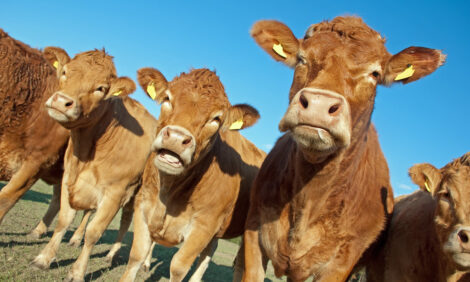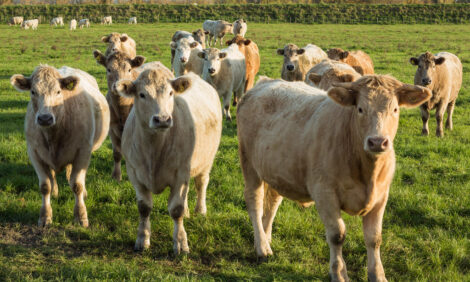



Compulsory Bluetongue Vaccine Programme
SCOTLAND, UK - A compulsory vaccination programme will be launched this winter to protect Scotland's livestock industry against the spread of bluetongue virus.The programme will not begin before the start of November and will depend on the prevalence of midges which spread the disease among animals. It will see all cattle and sheep in Scotland, almost seven million animals, compulsory vaccinated against the disease.
Other susceptible species, such as goats, deer, camelids (camels, lamas, alpacas etc) and non-farm animals such as buffalo and giraffes in zoos, will be vaccinated on a voluntary basis.
The Scottish Government has agreed to pay half the manufacturing costs of the vaccine (approximately £2.5 million) in the first year - an unprecedented level of support within the UK. The remainder will be met by the industry.
Speaking after a meeting with the industry where stakeholders agreed to the compulsory winter vaccination programme, Rural Affairs Secretary Richard Lochhead said the need to vaccinate this year had been reinforced by the increased risk to Scotland from recent incidences of bluetongue in England.
Mr Lochhead said:
"Scotland remains bluetongue free but there is a clear and present threat and we need to minimise the risk to Scotland. The vaccination programme I am confirming today is part of that.
"The prevalence of the disease in England has highlighted the need for a proactive vaccination campaign to safeguard Scotland's livestock sector.
"The campaign will not begin before November. This will allow us to vaccinate in the midge free period and also provide individual farmers with the time needed to plan vaccination in a way which best suits their business needs.
"While we have agreed to vaccinate this winter, the industry cannot afford to let down its guard. Care must be taken in sourcing livestock and farmers should continue to avoid buying animals from high risk areas wherever possible."
Charles Milne, Chief Veterinary Officer for Scotland, added:
"Vaccinating in the winter months when the lack of midges dramatically reduces the risk of disease circulation allows animals to develop immunity without exposure to significant risk. This is the most effective way to protect our livestock sector against this virus.
"It will take several weeks for every animal in Scotland to be vaccinated against this virus. Additionally, vaccination against bluetongue virus 8 (see notes) only provides immunity for the most prevalent form bluetongue virus currently within the UK. Livestock keepers therefore cannot afford to become complacent and risk importing further serotypes of this disease."
There are no human health implications from bluetongue virus. The virus effects ruminants (cattle, sheep and camelids) and can kill up to 10 per cent of cattle and 30 per cent of sheep. The virus, which is spread by midges, was first detected in the Netherlands in 2006 and has since spread across Europe, emerging in England last summer.
November 1 is the earliest date at which vaccination is possible. Precise dates will be provided once further scientific analysis has been completed on the temperatures experienced this year and the likely end of the live vector (midge) period is available. Sheep will require one dose of the vaccine and cattle two doses given four weeks apart.
Use of the vaccine before formal approval from the Scottish Government is subject to fines of up to £5,000 and a prison term of six months.
Bluetongue virus serotype 8 is the most prevalent form in Europe. Similar to most viruses there are various strains of the disease.


